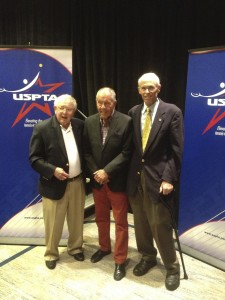
Former Gustavus Men’s Tennis Coach of 39 years, Steve Wilkinson was recently inducted into the United States Professional Tennis Association’s (USPTA) Hall of Fame. Wilkinson is the winningest coach in the history of collegiate tennis, winning two NCAA Division III titles and 35 MIAC titles.
By being inducted into the USPTA Hall of Fame, Wilkinson was recognized for the impact he made at Gustavus both on and off the court. Neal Hagberg, Director of Tennis and Life Camps, traveled to Orlando, Florida with Wilkinson for the induction ceremony on Sept. 27. Hagberg spoke of how Wilkinson’s acceptance speech was a perfect representation of his coaching style, and of Wilkinson as a person.
“He spent his acceptance speech talking about the Three Crowns and how we can serve others. I was in correspondence with one of the major award winners down there. He wrote me back and said, ‘Steve was the only one who spent his speech talking about how we can serve others, the rest of them spent their time talking about themselves.’ There were some famous people inducted. And that’s Steve in a nut shell,” Hagberg said.
Wilkinson’s interest for the game of tennis started at age 4, after watching his parents play at the park. He insisted on being included. Though tennis was not popular where he grew up, Wilkinson became hooked, and petitioned to play in the High School State Tennis Tournament.
The coach at the University of Iowa recruited Wilkinson as a high school senior, where he went on to play Division I tennis.
This was where Wilkinson’s tennis career took flight and where he learned principles he would later employ in his own coaching. These principles have become the foundation for Gustavus tennis and are still practiced and instilled in Gustavus tennis players.
“We focus too much on wanting to play our best every time we step out and that doesn’t happen either. So if you prioritize those two things [winning and playing your best], you start to worry, and you get nervous, and you don’t necessarily have your best performance. Instead, what I developed here at Gustavus is what we call the Three Crowns,” Wilkinson said.
The Three Crowns are comprised of three principles: positive attitude, full effort, and good sportsmanship. All of which are essential to tennis and life skills. The message of the Three Crowns communicates things that are completely within the athletes’ control, which helps produce positive results on the court. The Three Crowns, in combination with treating every practice like an actual match and learning to utilize strengths instead of dwelling on weaknesses, has stuck with Gustavus tennis and created successful teams over the years.
“One of the most important things in coaching is emphasizing things that are within our control. I learned that, in part, from my coach at the University [of Iowa]. We have a tendency to emphasize winning too much, and that is something that we finally don’t control,” Wilkinson said.
Wilkinson’s emphasis on specific values has not only strengthened the Gustavus tennis program, but has been heavily practiced at the Tennis and Life Camp since 1977. The non-profit program aims to teach the values of the Three Crowns to kids and families who wouldn’t normally be able to afford it. The camp combines teaching tennis skills with teaching campers how to apply the Three Crowns to real life situations. The program has upheld its original purpose, yet has expanded because of the positive reception it has received. Combining life lessons with athletics is becoming a popular idea.
“Steve talked about character driven sports before anyone even talked about it. And to be honest, he was ridiculed by people sometimes. The basis of what he started is still there, what has changed is people’s attitudes towards it. There was a tipping point that happened when the staff totally got on board, doing goofy things, but then teaching serious tennis, and putting the two together. It takes a special person to be able to do that and believe in it. Once that happened, it kind of took care of itself,” Hagberg said.
Wilkinson’s idea of combining ethics and sports is now a widely accepted concept that is being applied in the classrooms at Gustavus. Tommy Valentini, Head Men’s Tennis Coach and Instructor in Health and Exercise Science, is working to receive his PhD in order to begin as endowed chair in sport ethics at Gustavus. This would mean teaching courses in sport ethics every semester. Valentini hopes to push the values Wilkinson has taught even further by educating students about ethics related to athletics.
“Coach and his approach to tennis and life have been instrumental in my development as a sport ethics scholar and teacher. I am honored to be bringing sport ethics conversations to Gustavus students and the Gustavus community, and I’m endlessly grateful to Coach for his teaching, friendship, mentorship, vision, and support in helping me do so,” Valentini said.
The coaching style of Wilkinson has affected Valentini far beyond the court. Wilkinson practiced a unique, pressure-free coaching style that stressed the importance of teammate relationships and values, which is still the foundation for Gustavus Tennis.
“The values of the Three Crowns and the building of relationships and the things that he stressed certainly continue to be foundations for our program. He certainly influenced me as a coach with his style and how he communicates with players and the way he teaches the game. All aspects have had a huge impact on me, but I think more than that is his influence on me as a person, and I’m very thankful for that,” Valentini said.